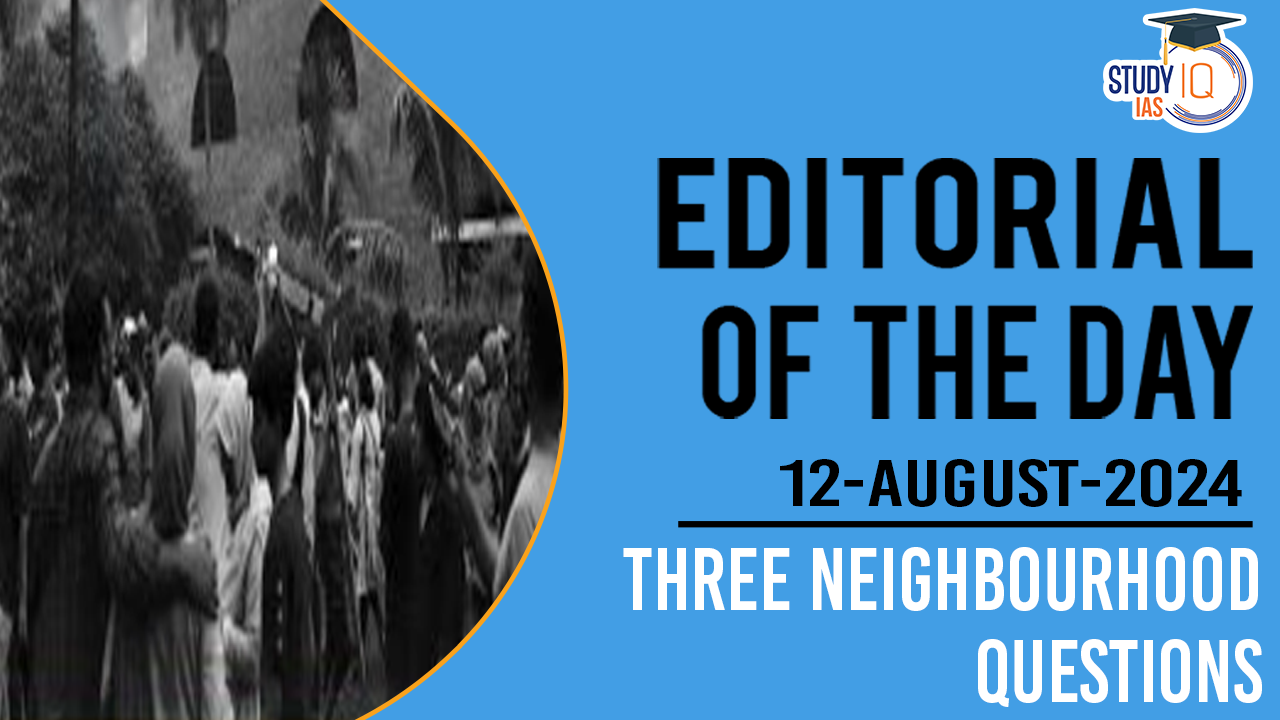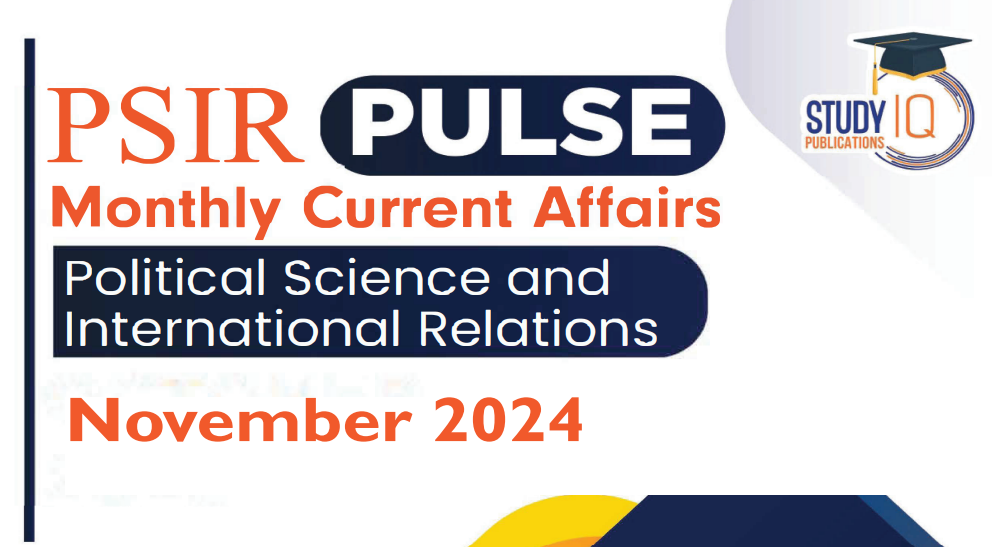Table of Contents
Context: In less than 3 years, India has faced severe setbacks in its foreign and security interests in neighbouring countries.
Neighbouring Countries with Setbacks
- Bangladesh: On August 5, Prime Minister Sheikh Hasina resigned amidst violent protests and fled the country.
- Maldives: On November 17, 2023, Mohamed Muizzu was sworn in as President, committed to reducing India’s influence and increasing China’s presence.
- Afghanistan: On August 15, 2021, President Ashraf Ghani fled as the Taliban took over, despite significant Indian diplomatic investment.
Key Indian Foreign and Security Agencies
Ministry Of External Affairs
- Origin: The Ministry of External Affairs (MEA) traces its origins to the British colonial era with the Foreign Department established in 1783.
- Post-independence in 1947, it became the Ministry of External Affairs and Commonwealth Relations, renamed MEA in 1948.
- Organisational Structure:
- Leadership: Headed by the Minister of External Affairs, assisted by the Minister of State for External Affairs and the Foreign Secretary.
- Divisions:
- Territorial: East Asia, West Asia and North Africa, Central Europe, Latin America, etc.
- Functional: Economic Diplomacy, Consular, Passport & Visa, Protocol, etc.
- Specialized: Disarmament and International Security Affairs, United Nations Political, etc.
- Functions and Responsibilities:
- Foreign Policy: Formulating and implementing India’s foreign policy.
- Diplomatic Relations: Conducting diplomatic relations with foreign countries and international organisations.
- Citizen Protection: Protecting the interests of Indian citizens abroad.
- Trade and Culture: Promoting India’s trade, commerce, and cultural relations.
- Treaties and Agreements: Negotiating international treaties and agreements.
- International Representation: Representing India at the United Nations and other forums.
- Diplomatic Missions: Managing India’s embassies and consulates abroad.
- Major Initiatives:
- Neighborhood First Policy: Improving relations with immediate neighbours.
- Act East Policy: Engaging with Southeast Asia and the Indo-Pacific.
- Link West Policy: Strengthening ties with West Asia, especially GCC states.
- India-Africa Forum Summit: Enhancing cooperation with African nations.
- International Solar Alliance: Promoting global solar energy use.
| About Neighbourhood First Policy |
|
Research and Analysis Wing (RAW)
- Genesis of RAW:
- Until 1968, the Intelligence Bureau (IB) managed both internal and external intelligence.
- The 1962 China-India war and the Indo-Pakistani war in 1965 highlighted the need for a separate external intelligence agency.
- In 1968, Prime Minister Indira Gandhi appointed R. N. Kao was the first director of the newly established Research and Analysis Wing.
- Function:
- Gathers military, economic, scientific, and political intelligence through covert and overt operations.
- Monitors terrorist elements and smuggling rings transporting weapons and ammunition into India.
National Security Structures
National Security Council (NSC)
- Formation: Established in 1999, the National Security Council (NSC) is the apex body for coordinating India’s national security and strategic policies.
- Chairmanship: The NSC is chaired by the Prime Minister and includes key ministers and officials responsible for defence, foreign policy, and internal security.
- Function: The council deliberates on security issues, assesses threats, and formulates strategic responses. It integrates inputs from various security and intelligence agencies.
National Security Advisor (NSA)
- Role: The NSA serves as the principal advisor to the Prime Minister on matters of national security, foreign policy, defence, atomic energy, and space issues.
- Influence: The NSA coordinates between different ministries and agencies, ensuring a cohesive approach to security challenges. The position has gained significant influence, especially in times of crisis, where direct communication with foreign governments is required.
National Security Council Secretariat (NSCS)
- Support Structure: The NSCS supports the NSC and the NSA, providing administrative and analytical support.
- It comprises multiple officials of Deputy NSA rank, each focusing on specific areas such as defence, intelligence, and foreign policy.
- Expansion: An officer of Additional NSA status was added recently to further strengthen its capabilities.
Reasons for the Indian System’s Surprise by Rapid Changes in Neighbouring Countries
- Intelligence and Analytical Failures: The intelligence agencies might have failed to gather accurate and timely information on the evolving political situations in these countries.
- Even when information was available, there might have been shortcomings in analysing and interpreting the data correctly, leading to underestimations of the risks and pace of changes.
- Turf Issues and Coordination Problems: Turf issues between various agencies (such as RAW, MEA, and other security organs) could have hampered the effective sharing and synthesis of intelligence.
- The different agencies might not have worked harmoniously, leading to fragmented and incomplete pictures of the situations on the ground.
- Over-Reliance on Specific Leaders: India’s foreign policy in these countries was heavily reliant on specific leaders (e.g., Sheikh Hasina in Bangladesh, Ibrahim Solih in Maldives, and Ashraf Ghani in Afghanistan).
- The abrupt changes in leadership destabilised India’s strategic interests.
- The sudden political upheavals, such as violent protests in Bangladesh and the rapid Taliban takeover in Afghanistan, were not anticipated despite visible signs of instability.
Conclusion
- These events underscore the need for India to reassess and strengthen its foreign policy mechanisms.
- Enhancing intelligence capabilities, ensuring harmonious functioning among various agencies, and adopting a more flexible and adaptive approach to policy-making are crucial steps.
- By addressing these shortcomings, India can better safeguard its interests and respond more effectively to the complex and rapidly changing geopolitical landscape in its neighbourhood.


 Pariksha pe Charcha 2025, Overview, Even...
Pariksha pe Charcha 2025, Overview, Even...
 National Policy on Framework on Agricult...
National Policy on Framework on Agricult...
 How Scientists used Scotch tape to Creat...
How Scientists used Scotch tape to Creat...




















